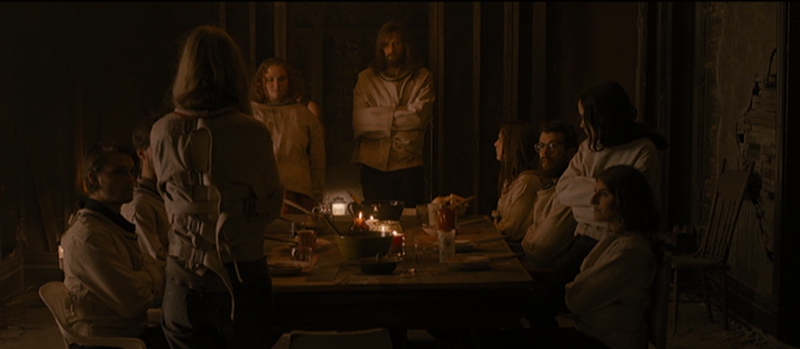
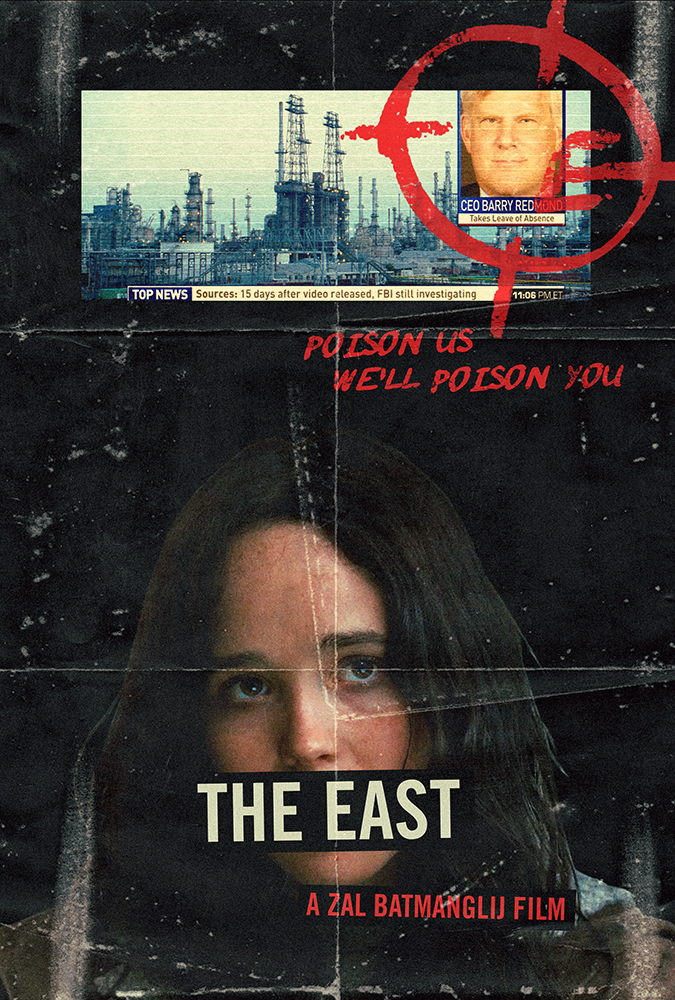
“It’s easy when it’s not your home; easy when it’s not your life. The place where you sleep, your kids, your wife. But when it’s your fault it shouldn’t be so easy to sleep at night. Especially when we know where you live.”
The East is reminiscent of other Brit Marling films, namely Another Earth (2011), and The Sound of My Voice (2011). All three were co-written by Marling, and The East and The Sound were co-written and directed by Zal Batmanglij. The premise is interesting—an intelligence agent must go undercover to infiltrate an activist/terrorist organization—and there is a lot to admire about the film, but some missteps stop the film from ever fulfilling the potential laid down by the first act.
Our protagonist is Jane (Marling), who leaves the FBI for the private sector, working for a private intelligence firm led by a stone cold capitalist (Patricia Clarkson) that protects large corporations from activist retaliation. Her assignment is The East, an eco-terrorist group who have publicly taken shots at massive corporations whose practices have caused massive harm against humans and the environment—drugs with nasty side effects, dumping chemical waste in creeks, etc. After sleeping on the beach and train-hopping for a few days, Jane—now going by Sarah—is able to work her way into the compound. The departure of another member of the group leads to her involvement in a “jam,” where The East spikes the champagne at a pharmaceutical company’s executive party, administering their own drug to them; the same antibiotic that is slowly causing Doc’s (Toby Kebbell) neurosystem to degenerate.
Like Sean Durkin’s Martha Marcy May Marlene (2011), the filmmakers are careful to avoid villainizing the film’s subject, making a point to show the appeal of the activist and anti-consumerist lifestyle. As successive jams are pulled off, the audience begins to see what drew these young people to reject modern life and the evils of corporate America, finding purpose in the group’s identity. Just as our protagonist becomes uncertain of her own stance, the audience is unsure who to root for, as the moral dilemmas are painted in shades of gray.
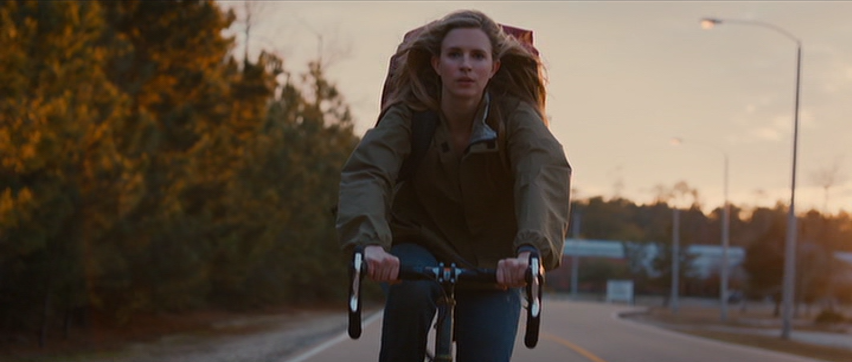
It should be mentioned that the depiction of the freegan group is based on Batmanglij and Marling’s experiences train-hopping and dumpster diving several years prior when they were youngsters seeking purpose in a similar way to the film’s activists (though they didn’t participate in any terrorist acts). Occasionally, the film dips a little bit too far into intentional apologetics for the lifestyle, marring the compelling story, but it’s never egregious.
The film’s biggest misstep is that when Jane integrates herself into the group and learns more about each of them, all of the characters are revealed to be the children of rich parents who have some sense of personal redemption driving their activist egos. Izzie (Ellen Page), for instance, attends the quarterly summit for an energy company where her father is an executive, confronting him before kidnapping him and forcing him to bathe in the water where his company dumps waste. Eve (Hillary Baack), a young deaf woman, seems to be the only one who joined the group without a personal vendetta against a specific corporation, but instead the film implies that she joined because she has been rejected by society due to her disability.
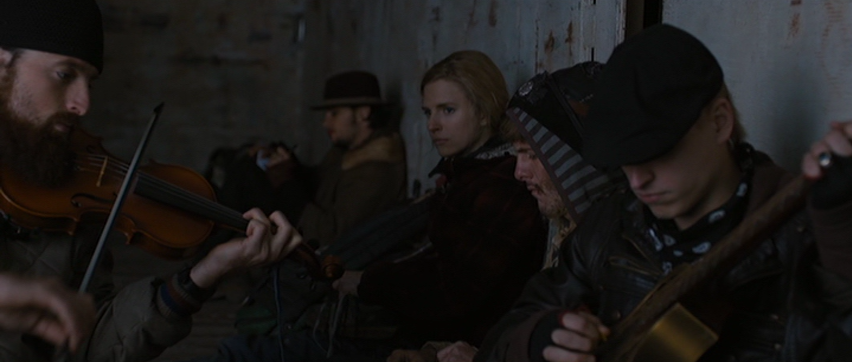
The cast performs well for the most part, with Alexander Skarsgård as group leader Benji, and Toby Krebbell as Doc being of particular note. One of the most haunting scenes in the film is the one-two punch of the pharmaceutical executive (Julia Ormond) first announcing with smiles that the drug has had no ill effect on her and that she was happy to be “given a taste of her own medicine,” followed by a shot of her mentally deteriorated, admitting that she cannot recognize herself in the mirror.
The music is also used to great effect in two montage sequences. Midway through, Doc plunks away at an abandoned piano, and we are presented with a haunting piece performed by Rostam Batmanglij (Zal’s brother, and former member of Vampire Weekend). On the DVD, there is an interview with the two brothers, where they discuss their attempts at collaboration growing up and compare and contrast their work now. Zal claims that while working on set he would sometimes have Rostam’s music playing through his earphones in order to set his mood for filming. Later, in another sequence where Jane is fraying mentally and emotionally, The National’s track ‘About Today’ plays and carries a great emotional heft after the nearly barren soundtrack leading up to it.
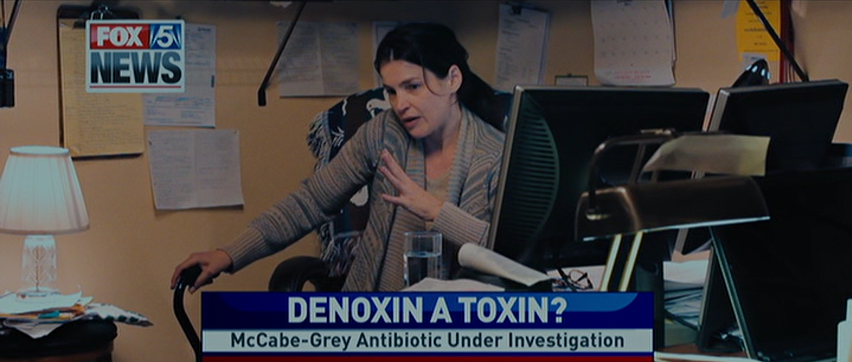
There is a bit of intentional weirdness that seems to be there only for spectacle. For example, the group members eat dinner in straightjackets, which forces them to feed one another; they play spin the bottle and request to kiss one another; and they bathe one another in the lake. The presence of these oddities didn’t bother me, but it didn’t feel like they fit very well. The ending is pretty underwhelming and felt a bit clichéd, with Jane turning on her agency and confronting each undercover agent like herself, convincing them to turn to activism as well. Graciously, this is only hinted at and shown in a few images as the credits roll; but it still feels like a bit of a letdown compared to the rest of the film.
Zal Batmanglij and Brit Marling are certainly a duo to watch. Their Netflix series The OA has attracted a lot of fans, but I would prefer if they got back to filmmaking.